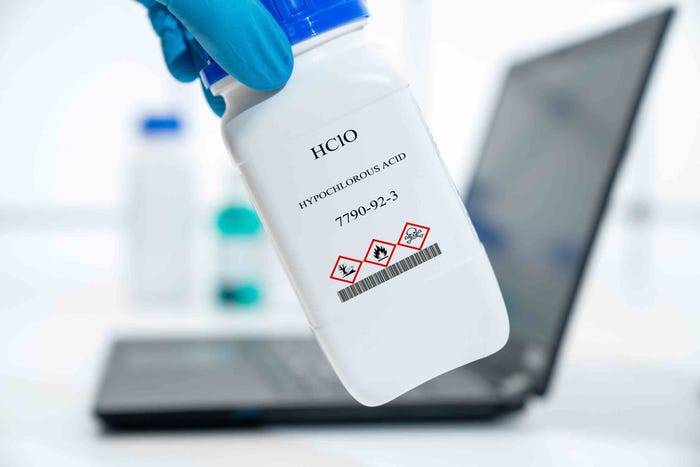Hypochlorous acid serves as valuable tool for food safety experts
Growing consumer demand for sustainable food safety solutions is driving the rise of hypochlorous acid (HClO) as a powerful, eco-friendly disinfectant for the food industry. Food safety professionals from EcoloxTech and Savvy Food Safety Inc. detail how HClO is helping food businesses elevate safety protocols.

At a Glance
- Consumers increasingly prioritize sustainability and food safety, driving food businesses to adopt responsible practices.
- HClO emerges as a powerful disinfectant that effectively tackles foodborne illness while being nontoxic and eco-friendly.
- By using HClO, food businesses can enhance sanitation processes, reduce water usage and contribute to a healthier planet.
Sustainability isn’t just a business buzzword. It’s something that’s becoming increasingly important to consumers and businesses. As most consumers (90%) say sustainability matters to them, a recent McKinsey & Co. survey found that two-thirds of all respondents (and 75% of Millennial respondents) consider sustainability when making a purchasing decision. As a result, many food and beverage businesses are becoming more deliberate in prioritizing (and elevating) their sustainable, responsible and eco-friendly practices.
Safety, sustainability go hand in hand
While sustainability is a priority for many food brands, so is food safety. Therefore, many food businesses want to use the most effective and sustainable products to keep their foods, employees and customers safer.
An essential food safety practice is properly sanitizing and disinfecting surfaces, equipment and food, which is evident in the wake of recent foodborne illness outbreaks involving cantaloupe, stone fruits and charcuterie meats. Skipping this step — and/or inefficient sanitizing and disinfecting efforts — can result in food safety breaches, expensive litigation and damage to a food brand’s reputation.
Keep in mind that not all sanitizing and disinfecting agents are sustainable or effective. Some contain chemicals and other toxic ingredients that can harm the health of employees, consumers and the environment. Look for products like hypochlorous acid (HClO) that are extremely effective, and also safe, eco-friendly and certified by reputable government agencies.
Changing consumer demands around sustainability are helping to drive the trend for safer, more sustainable products. Now, more food businesses are relying on HClO — a powerful, versatile, safe disinfectant and sanitizer that’s also sustainable, eco-friendly and safe for foods, people and the environment. This no-rinse option also reduces food brands’ water usage.
What is HClO?
HClO is generated through electrolysis, where noniodinated salt and water are combined, resulting in a solution that contains hypochlorous acid, a powerful sanitizing agent. HClO is naturally formed in various environments, including the human body, and plays a crucial role in disinfection and protection against pathogens. Increasingly, companies are harnessing its potential for various applications, including disinfection, sanitation and water treatment.
HClO is nontoxic, sustainable and safe for use on and around food. Unlike some other sanitizers that may leave harmful residues, HClO breaks down into simple saltwater after use, posing no risk to consumers or the environment.

Some sanitizers and disinfectants, including ozone, can be hazardous to human health if inhaled in significant quantities, but nontoxic, chemical-free HClO eliminates the risks for respiratory issues. HClO breaks down into harmless substances, whereas ozone can produce harmful byproducts in certain conditions. Also, ozone can sometimes leave a distinct smell or taste, particularly in water, but HClO doesn’t affect the taste or odor of treated products, which is crucial for food and beverage businesses.
Importantly, since HClO doesn’t contain the harsh chemicals found in many traditional sanitizers, it’s safer for workers handling it. Unlike other sanitizers, it also reduces the chemical contamination risks for food.
Boost ESG practices
Socially conscious stakeholders — including employees, customers, investors, suppliers and distributors — want to support, collaborate with and invest in sustainable businesses. Now more than ever, organizations’ success and growth depend on a strong Environmental, Social and Governance (ESG) strategy. ESG governance can boost a brand’s key metrics, including sales, customer loyalty and retention, investments and more.
Today, many companies are improving their ESG performance by implementing sustainable practices and contributing to a healthier planet. This means taking actions like reducing waste; decreasing energy use; buying ethically sourced products; and using cleaner, greener products.
Using HClO in the food industry can improve food safety, extend shelf life, reduce food waste and decrease water use. HClO is nontoxic and chemical-free, yet 80 to 100 times more powerful than bleach. It’s eco-friendly and proven to kill even the toughest pathogens. It’s also safe for humans, food and the environment.
EPA, FDA, CDC, USDA compliant
HClO is compliant with the Centers for Disease Control and Prevention (CDC), Food and Drug Administration (FDA) and Environmental Protection Agency (EPA) regulations, so food businesses can feel comfortable and confident using it, knowing that it meets the U.S. governing bodies’ stringent safety and quality guidelines. Additionally, the United States Department of Agriculture (USDA) approves the use of HClO in organic food production.
HClO can uniquely and significantly improve two essential factors in the food industry: sustainability and food safety.
About the Authors
You May Also Like



